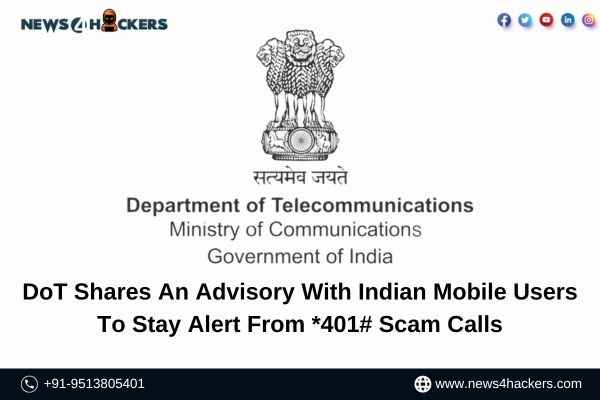DoT Shares An Advisory With Indian Mobile Users To Stay Alert From *401# Scam Calls

DoT Shares An Advisory With Indian Mobile Users To Stay Alert From *401# Scam Calls
Synopsis:
The Department of Telecommunications (DoT), Ministry of Communications has cautioned citizens to be cautious when receiving fraudulent incoming calls that prompt them to dial *401# followed by an unknown cellphone number.

Visualize a scenario where your mobile device emits a sound indicating an incoming call, and upon answering, you are greeted by an individual who identifies themselves as a cordial representative from your telecommunications provider.
It has been reported that there is a minor disruption in your network, but there is no need to worry as there is a straightforward solution available. To complete the process, simply enter the special code “*401#” and then dial the number they supply, which may be questionable. Appears innocuous, correct? Incorrect. The Department of Telecom (DoT) is warning cellphone customers about a clever new scam that is specifically targeting them.

As per the Department of Telecommunications (DoT), a fraudulent individual will contact a telecommunications subscriber, pretending to be a customer service representative or technical support staff from their specific telecommunications service provider.
Subsequently, the caller persuades the recipient that there is a complication concerning their SIM card or a matter pertaining to the network or service quality.

In order to supposedly fix the problem, the user is compelled to dial a particular code, usually starting with ‘*401#’ and then followed by an unknown cell number. This apparently harmless move initiates a worrisome sequence of events – it enables the activation of unconditional call forwarding on the subscriber’s mobile number, sending all incoming calls to the unfamiliar cellphone number provided by the scammer.
Upon activation of call forwarding, the fraudster obtains unauthorized access to all incoming calls meant for the subscriber. Such a concerning situation might be manipulated by criminals for deceitful intentions, emphasizing the importance for individuals to stay watchful and well-informed.

The Department of Telecom has made every effort to highlight the gravity of this issue. In an official statement, they strongly urged consumers to exercise prudence when receiving inbound calls that encourage them to dial ‘*401#’ followed by an unfamiliar mobile number.
The Department has cautioned citizens to be cautious of getting malevolent inbound calls requesting them to dial *401# followed by an unfamiliar cellphone number. This triggers the activation of unconditional call forwarding from the mobile phones of people to an unidentified mobile number. The statement cautioned that this enables fraudsters to intercept all incoming calls and exploit them for fraudulent purposes.
Prevention and Precaution
In order to protect themselves from falling prey to this fraudulent scheme, the Department of Telecommunications (DoT) advises consumers to refrain from dialing the code ‘*401#’ or any other strange codes given by unidentified callers.

If customers find themselves in a scenario where they have unintentionally activated call forwarding as a result of such a scam, it is crucial to swiftly deactivate it. These are the instructions to adhere to:
- Access the settings menu on your mobile device.
- Access the call settings.
- Deactivate the call forwarding feature or reset to the original settings.
By adhering to these straightforward procedures, users can proactively avert the redirection of their calls to unscrupulous individuals and effectively safeguard themselves against such fraudulent activities.
It is Sincerely A Growing Concern!
Given the growing complexity of cybercriminal tactics, it is crucial for mobile phone users to remain well-informed and exhibit prudence when encountering unusual calls and instructions.
The advisory from the Department of Telecom serves as a timely reminder for citizens to stay watchful and take measures to safeguard their privacy and security in the digital era.
About The Author:
Yogesh Naager is a content marketer who specializes in the cybersecurity and B2B space. Besides writing for the News4Hackers blog, he’s also written for brands including CollegeDunia, Utsav Fashion, and NASSCOM. Naager entered the field of content in an unusual way. He began his career as an insurance sales executive, where he developed an interest in simplifying difficult concepts. He also combines this interest with a love of narrative, which makes him a good writer in the cybersecurity field. In the bottom line, he frequently writes for Craw Security.
READ MORE ARTICLE HERE






